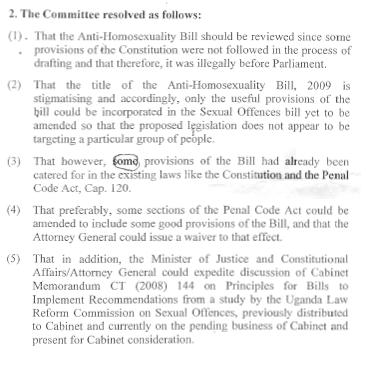According to this report and the Order Paper from today’s session, The HIV/AIDS Prevention and Control Bill was tabled for first reading before Uganda’s Parliament this morning. The bill would criminalize the intentional transmission of HIV. However, the wording of the bill is raising critical concerns among human rights groups.
The Human Rights Watch has a detailed and updated analysis of the bill here. Apparently, this bill has been contemplated for some time and is not simply an effort to carve up the Anti-Homosexuality Bill and attach the pieces to new legislation. Nonetheless, there are concerns raised by the HRW which are valid and I hope will be considered favorably by Uganda’s legislators.
According to the Parliament website, the Parliament is now on recess:
Parliament is on recess following the end of the fourth session of the Eighth Parliament. The recess marks the end of the fourth year of the Eighth Parliament. The Speaker of Parliament Rt.Hon.Edward Kiwanuka Ssekandi hailed Members of Parliament for their harmonious co-existence in a multiparty Parliament. He says cooperation between members of the different political parties is key to the success of the multiparty political dispensation in Uganda. Pending business not concluded by Parliament in this session will be carried over to the next session that opens in June.
This article on the Parliament website seems to be related to the bill just tabled:
Members of parliament are proposing new strategies to combat the HIV/AIDs disease following reports of stagnation in its eradication in many parts of the country. Legislators propose a refocusing of efforts to implementing effective HIV prevention programs to reduce new emerging infections. A report by the Parliamentary Committee on HIV cites stabilization in disease prevalence between 6.1 and 6.5% during the last five years. This development is partly due to complaceny, behavioural factors and failure to balance efforts between prevention and treatment. Hon Beatrice Rwakimari the chairperson of the committee expressed concern over the shift in the epidemic from people in single casual relationships to those in long term stable relationships.
She told Parliament that the shortage of all cadres of health workers to provide HIV prevention, treatment, care and support services has grossly affected service delivery. Understaffing, low motivation, staff transfers, redeployment and the high attrition rates are affecting continuity in the efforts to fight HIV.
The Parliamentary Committee on HIV noted that AIDS related services have remained inadequate in both scope and coverage, posing a threat to prevention of the disease. Many Ugandans are not aware of their HIV status while almost half of the people eligible to be on ARVs have not been enrolled and cannot access treatment.
The Committee proposed improvements in treatment, care and support systems for all people affected, provision of ARVs,and expansion of all essential care and treatment services to all district health units.
Concerns about HIV/AIDS were outlined in a Parliament summary report of the 2009-2010 session from various committees. Specifically the Uganda Aids Commission reported:
III. Uganda Aids Commission (UAC)
The surge in the Prevalence rate of HIV/AIDS
5.14 The Committee noted with concern that in the recent past, there has been an upward surge in the prevalence of HIV/AIDS in Uganda. The committee is concerned that the current strategy seems to be directed to the young people other than the age group which is most affected by the increasing rate of infection. Current statistics indicate that the new infections are occurring among married couples. According to the latest figures from UAC, the prevalence rate among married couples for men is 9.9% while for women is 12.1%. This is not a good trend.
5.15 The Committee recommends that government has to design a new strategy in the fight against HIV/AIDS if the new surge is to be effectively responded to. UAC needs to strengthen the campaign on prevention other than popularizing the effectiveness of ARVs since it is not a cure.
When I am able to secure a copy of the bill, I will post it here.
Here is some additional background on the bill.
